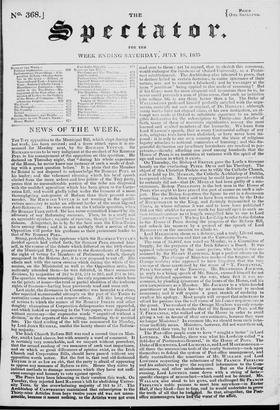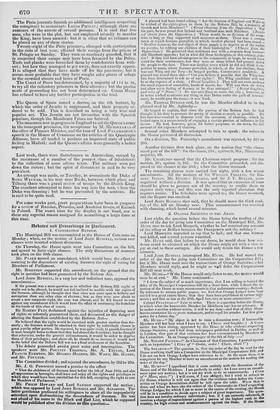NEWS OF THE WEEK.
THE Tory opposition to the Municipal Bill, which slept during the last week, Las been revived; and a fierce attack upon it is an- nounced for Monday next, by Sir RICHARD VYVYAN. Sir RICHARD seems to be very indignant at the conduct of Sir ROBERT PEEL in his management of the opposition on this question. He
declared on Thursday night, that "during his whole experience of the House, he never knew one instance of such a mode of deal- ing with a great question before." It is plain that the Member for Bristol is not disposed to acknowledge Sir ROBERT PEEL as his leader; and the vehement cheering which his brief speech elicited from the more ardent and less politic of the Tory party, proves that no inconsiderable portion of the tribe are disgusted
with the modified opposition- which has been given to the Cerpe- ration Eill, and would gladly inlist under the banners of a more thoroughgoing antagonist of Reform than their present com- mander. Sir RICHARD VYVYAN is not wanting in the qualifi- cations necessary to make an efficient leader of the more..bigoted.
Anti-Refermers. He was stanch on the Catholic question, when Sir li,opEasr PEEL•ratteds • He has never committed himself by the adeocacy Of any Reforming measure. Then, he is a ready aud an agreeable speaker ; capable of exertion, though inciinel to in- dolence. Altogether, he is by far the best man the Ultra-Tories
have among them ; and it is not unlikely that a section of the Opposition will prefer his guidance as their permanent leader to that of Sir ROBERT PEEL.
Stung, probably,by the applause which Sir RICHARD VYVYAN'S decided speech had called forth, Sir ROBERT PEEL. exerted him-
self, in the course of the debate which followed on the 10th clause of the Municipal Bill, to preserve to the descendants of freemen the right of voting for Members of Parliament, which, though recognized in the Reform Act, it is now proposed to cut off. His efforts met with the same success which during the whole of the session, on the Ministerial as well as the Opposition seats, has uniformly attended them—he was defeated, in three successive divisions, by majorities of 262 to 234, 234 to 203, and 234 to 163. The speeches were uninteresting; the only arguments which bore on the points at issue—the total or partial abolition of the inchoate rights of freemen—having been previously used and worn out. Last night, the discussion in Committee was brought to a close, after repeated unsuccessful attempts on the part of the Tories to neutralize some clauses and remove others. All the long string
of notices to which the names of Sir ROBERT INGLIS and other doughty champions of Corporation delinquencies were appended,
and which looked so imposing in the Vote-paper, were disposed of Without ceremony—the expressive words " negatived without a division," in the reports of this morning, indicating their merited
fate. The third. reading of the bill was announced for Monday, by Lord JOHN RUSSELL, amidst the hearty cheers of the Reform- ing majority.
The Irish Church Reform Bill was read a second time on Mon- day, amidst loud cheers, but with scarcely a word of comment. It
is certainly very remarkable, and we suspect without precedent, that the second reading of iwo measures of such vast importance, and on which so great differences of opinion exist, as the Irish Church and Corporation Bills, should have passed without any Opposition worth notice. But the fact is, that real old-fashioned Toryism is at so low an ebb, that the party is afraid of appearing to oppose any measure of Reform in lob. Hence they strive by indirect methods to damage measures which they have not suffi- cient courage and honesty to vote against openly. The Peers have been labouring in their vocation this week. On Tuesday, they rejected lord RADNOR'S bill for abolishing Univer- sity Tests, by the overwhelming majority of 163 to 57. . The Archbishop of CANTERBURY maintained that subscription to the Thirty-nine Articles from boys twelve years old was not unrea- l/011We, because it meant nothing, as the Articles were not even read over to them : yet he argued, that to abolish this ceremony, would endanger the existeace of Oxford University, as a Protes- tant establishment. The Archbishop also laboured to prove, that . to declare belief in certain doctrines' in entire ignorance of their nature, was not to commit a falsehood; and he was angry at the term " jesuitism " being applied to this mode of reasoning ! But if his Grace were fur more eloquent and ingenious than he is, he . never could persuade a man of plain sense, that such an initiation into college life is any thing better than a lie. The Duke of WELL' NOTON professed himself perfectly satisfied with the argu- • ',lents, certainly not new or original, of Dr. HowLsv; although many weeks have not elapsed since, at his own instigation, an at- tempt was made at Oxford to substitute signature to an intelli- gible declaration for the subscription to Thirty-nine Articles of faith, many of them of uncertain signification among the most learned and es:alted members of the hierarchy. We learn from Lord RADNOR'S speech, that in every Continental college of any note, religious tests have been abolished, or have never been im- posed : it is only in our own country that the 'stain of religious bigotry attaches to national seminaries of learning ; and this dis- gracefid distinction our hereditary lawthakers are resolved to per- petuate.—thereby affording one proof among hundreds that the HOREB of Peers is an institution at variance with the spirit of .the -
age and nation in which it exists. "
On Thursday, the Bishop of EXETER gave the Lords a tiresome homily on the everlasting PETER DENS and his TheoloO. The object of this- Christian Prelate was to vilify-the Catholic Church, and to hold up Dr. MURRAY, the Catholic Archbishop of Dublin, to especinl odium. Even supposing lie could have proved-s--which he certainly did not—that Dr. MURRAY had been guilty 'cif a mis- 'statement, Bishop PHILLPOTTS is the last man in the House of Peers who ought to have played the part of censor on such a "sub- ject. Has the Bishop forgottten the figure he cut in a discussion respecting a certain letter said to have been written by the Duke of BUCKINGHAM to the King, and furtively transmitted to the Times, in whose columns it was said to have been published ? Did not this stickler for exact truth lay himself open to such se- vere animadversions as at length compelled him to sue to Lord FROMM fer mercy ? We beg his Lordship to refer to the debates in the House of Peers during the progress of the Reform Bill, and refresh his memory by a perusal of the speech of Lord. BitouonSM on the occasion we allude to.
Lord MELBOURNE shone as a debater, and a truly Libsral man, both in this discussion and that on the University Tests.
The sum of 35,0001. was voted on Monday, in a Committee of Supply, for the purposes of the Irish Educe!' a Board. It was opposed vehemently by the same parties, who when it was an- nounced by Sir HENRY HARDT NOE, kept a perfect silence on its enormity. The change of Minieters unclosed the tongues of the Orange zealots; who appeared to have forgotten that the vote was one of those sanctioned by the name of " T. FREMANTLE,'" PEEL'S Secretary of the Treasury. Mr. DEliONSHER JACKSON, la reply to a biting speech of Mr. SHEIL, excused himself for not having declared opposition to the vote, when first it was an- nounced, by pleading ignorance of the forms of the House, and his own inexperience as a Member. Mr. JACKSON is a white-headed practitioner at the Irish bar—by no means deficient in modest assurance; and it will require a great stretch of credulity to swallow his apology. Most people will suspect that reluctance to offend his patrons was the real cause of his firmer acquiescence in the grant. The conduct of the Orange Members was only consis- tent; but how can we describe that of Sir ROBERT PEEL and Sir 1'. FREMANTLE, who walked out of the House in order to avoid giving a vote in favour of their own estimates, because they were no longer Ministers? In common life, we should term such beha- viour ineffably mean. Ministers, however, did not want their aid, but carried their vote, by 141 to 43. The Post-office people seem to have " caught a tartar" in Lord LOWTHER. On Monday, there was what his Lordship called " a field-day of Postmasters-General," in the House of Peers. The Duke ofRICHMOND,Lord LICHFIELD, and Lord MARYBOROUGH- all three the unconscious tools of the crafty Secretary—took upon themselves to defend the system of Post-office management, and flatly contradicted the assertions of Mr. WALLACE and Lord LOWTHER respecting the reluctance of Sir FRANCIS FREELING and his subalterns to give the required information to the Cour missioners, and other misdemeanours. But on the following evening, Lord LOWTHER came down with a string of facts— specific charges of misconduct—which could not be denied. Mr. WALLACE also stood to his guns, and challenged Sir FRANCIS FREELING'S noble patrons to meet him anywhere—in Exeter Hall, if they liked—face to face, and he would undertake tei prove the truth of all that he ha id. So that, altogether, the Post- office misroanagers have htuf1ttie worst of the affair,
The Paris journals furnish no additional intelligence respecting the conspiracy to assassinate Louis PHILIP; although there are rumours of the arrests of several persons. It is said that five men, who were in the plot, but not employed actually to murder the King, have been secured: but it is clear that no reliance can be placed on any of these stories.
Twenty-eight of the Paris prisoners, charged with participation in the riots of last year, effected their escape from the prison or St. Pelagie on Sunday. They were so carelessly guarded, that it is suspected their escape may have been favoured by the Police. Tools and planks were furnished them by confederates from with- cut; but how they managed to get away, does not exactly appear. It is alleged that they have made off for the provinces; but it seems more probable that they have sought safer places of refuge in the crowded streets and lanes of Paris.
The Court of Peers has determined, by a majority of 114 to 16, to try all the refractory prisoners in their absence; -but the precise mode of proceeding has not been determined on. Count MOLE has refused to have any further participation in the trial.



























